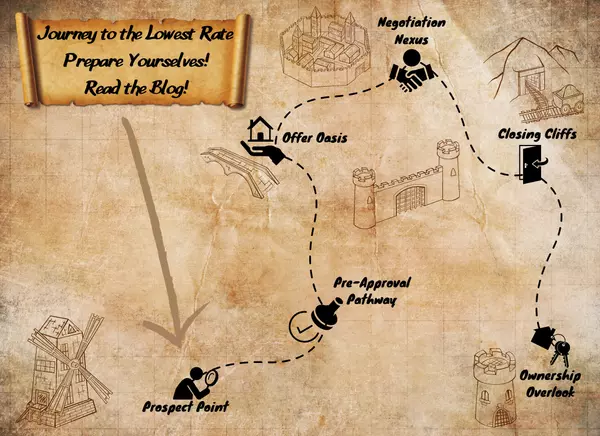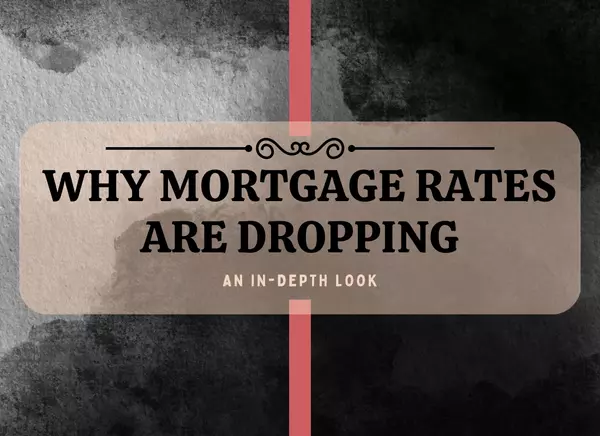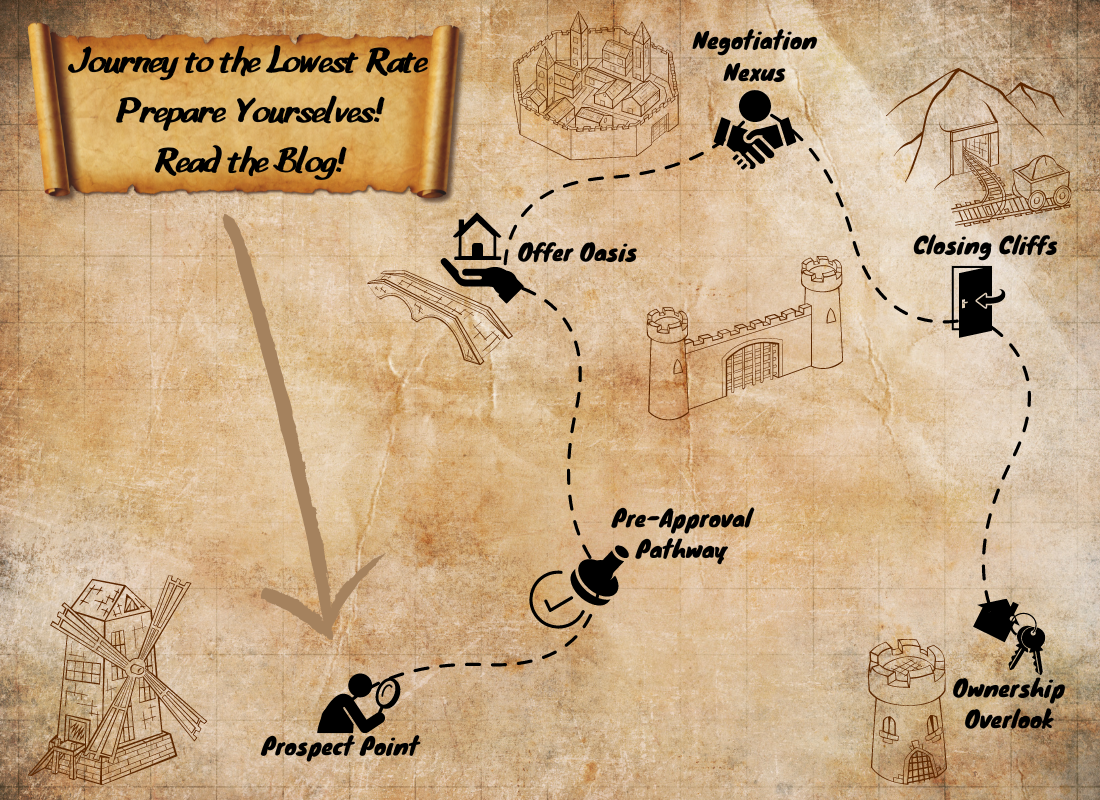The Importance of Representation as Mortgage Rates Decrease
The Importance of Representation as Mortgage Rates Decrease
Navigating the Real Estate Market with Confidence
In the ever-changing world of real estate, having a trusted professional by your side can make all the difference. As mortgage rates decrease, the market dynamics shift, presenting new opportunities and challenges for buyers, sellers, and investors alike. Agent representation becomes more crucial than ever in helping you navigate these changes effectively.
Whether you're a first-time homebuyer eyeing your dream house, a homeowner looking to sell, or an investor seeking the next big opportunity, understanding the role of a real estate agent is essential. They bring expertise, negotiation skills, and valuable insights that help you make informed decisions in a competitive market.
In this article, we'll explore why agent representation is more important than ever as mortgage rates fall. We'll delve into how agents can help you capitalize on these rate decreases, understand market trends, and ensure a smooth transaction from start to finish.
Understanding Agent Representation
Agent representation refers to the professional services provided by real estate agents who act on behalf of buyers or sellers during property transactions. They serve as intermediaries, guiding clients through the complexities of buying or selling a home. Their knowledge and experience are invaluable assets that can save you time, money, and stress.
Buyer's Agent vs. Listing Agent
There are two main types of real estate agents, each serving different roles:
Buyer's Agent
- Market Knowledge: These agents provide insights into local market trends, including property values, neighborhood developments, and future growth prospects. This information helps you make informed decisions about where and when to buy.
- Property Search: They have access to multiple listing services (MLS) and can find properties that match your criteria, sometimes even before they're publicly listed.
- Negotiation: Agents negotiate on your behalf to get the best price and terms. They understand market conditions and can advise on appropriate offer strategies.
- Handling Paperwork: Real estate transactions involve complex contracts and legal documents. Agents ensure that all paperwork is completed accurately and submitted on time, protecting your interests.
- Coordination of Inspections and Appraisals: They help schedule and coordinate necessary inspections and appraisals, interpreting the results and advising on next steps.
Listing Agent
- Pricing Strategy: Listing agents conduct comparative market analyses to determine a competitive listing price that attracts buyers while maximizing your profit.
- Marketing Expertise: They create marketing plans that may include professional photography, virtual tours, online listings, social media promotion, and open houses to showcase your property effectively.
- Screening Buyers: Agents pre-qualify potential buyers to ensure they are serious and financially capable, saving you time and effort.
- Negotiation: They handle offers and counteroffers, aiming to achieve the best terms and price for your property.
- Transaction Management: Agents oversee the entire selling process, coordinating with buyers, other agents, inspectors, and attorneys to ensure a smooth closing.
In both cases, agents provide guidance and support, helping you navigate challenges and make informed decisions. Want to learn more about the role of real estate agents? Click here to read my previous blog on the subject!
The Impact of Decreasing Mortgage Rates on Real Estate
When mortgage rates decrease, it generally means borrowing is more affordable. This shift can significantly impact the real estate market, influencing buyer behavior, housing demand, and pricing.
How Lower Mortgage Rates Affect Buyers
- Increased Affordability: Lower interest rates reduce monthly mortgage payments, making homeownership more accessible. Buyers may qualify for larger loans, allowing them to consider homes that were previously out of reach.
- Greater Purchasing Power: With reduced interest expenses over the life of the loan, buyers can invest more in their property or allocate funds to other financial goals.
- Competitive Market: As more buyers enter the market to take advantage of low rates, competition for desirable properties increases. This can lead to bidding wars and faster sales cycles.
How Lower Mortgage Rates Affect Sellers
- Higher Demand: More qualified buyers in the market can lead to increased interest in your property, potentially resulting in multiple offers.
- Potential for Higher Offers: Increased competition among buyers may drive up home prices, benefiting sellers looking to maximize their return.
- Strategic Timing: Sellers may find it advantageous to list their homes when rates are low to attract more buyers and achieve a quicker sale.
However, it's important to note that lower rates don't automatically guarantee an easy market. Other factors such as the overall economy, housing inventory, and regional trends also play significant roles. An experienced agent can help you understand these factors and how they affect your specific situation.
Want an even deeper analysis of what factors affect mortgage rates? Click here to read my previous blog on the subject!
Capitalizing on Rate Decreases with Agent Representation
A skilled real estate agent can help you make the most of falling mortgage rates by providing strategic guidance and personalized support.
Market Strategy and Timing
Agents monitor market conditions closely, including interest rate trends, buyer demand, and housing inventory. They can advise you on the optimal time to buy or sell, ensuring you take advantage of favorable conditions.
For buyers, this might mean acting quickly to secure a property before rates rise or competition increases further. For sellers, it could involve timing your listing to coincide with peak buyer activity.
Access to Professional Networks
Agents have established relationships with mortgage lenders, home inspectors, appraisers, and other professionals involved in real estate transactions. They can connect you with trusted lenders offering competitive rates and favorable loan terms.
Their network can also provide access to off-market listings or upcoming properties, giving you an edge in a competitive market.
Expert Guidance
Understanding how rate changes impact your real estate goals can be complex. Agents can explain the implications of different interest rates, loan types, and financing options. They help you evaluate how these factors align with your budget and long-term plans.
For investors, agents can identify opportunities that offer strong returns, leveraging low borrowing costs to maximize profitability.
The Value of Professional Guidance During Rate Decreases
During periods of fluctuating mortgage rates, professional guidance is invaluable in navigating uncertainties and making informed decisions.
Staying Informed
Agents keep abreast of economic indicators, policy changes, and market forecasts that affect mortgage rates and real estate trends. They can provide timely updates and interpret how these developments impact your buying or selling strategy.
Mitigating Risks
Real estate transactions involve significant financial commitments. Agents help identify potential risks, such as overextending your budget, falling into unfavorable contract terms, or overlooking property issues that could lead to costly repairs.
They conduct due diligence, ensuring that you have all the necessary information to make sound decisions.
Financial Advice Coordination
While agents are not financial advisors, they can collaborate with your financial planner or accountant to align your real estate decisions with your overall financial goals. They can also recommend reputable mortgage brokers or lenders who can offer personalized loan options.
Navigating Market Trends and Pricing Strategies
Understanding and adapting to market trends is essential for success in real estate. Agents provide valuable insights and develop strategies tailored to your objectives.
Data Analysis
Agents analyze data on recent sales, price trends, days on market, and inventory levels in your area. This information helps you understand the current market climate and anticipate future shifts.
For example, if data shows that homes in your desired neighborhood are selling quickly above the asking price, your agent may advise you to make a strong initial offer.
Pricing Expertise
Setting the right price is crucial. For sellers, pricing too high may deter potential buyers, while pricing too low could mean leaving money on the table. Agents use comparative market analyses (CMA) to determine a price that reflects your home's value and attracts buyers.
For buyers, agents help you craft offers that are competitive yet within your budget. They consider factors such as the property's condition, market demand, and seller motivations.
Adaptability
The real estate market can change rapidly due to economic shifts, policy changes, or local developments. Agents stay agile, adjusting strategies as needed to keep you ahead of the curve.
Legal and Financial Expertise
Real estate transactions involve numerous legal and financial considerations. Agents guide you through these complexities to ensure a smooth process. However, it is always important to note that it is recommended that you consult with a certified legal or financial advisor first regarding any questions you may have about the procedure or the next steps moving forward in a transaction.
Contracts and Regulations
Agents are well-versed in real estate laws, regulations, and standard practices. They ensure that contracts are properly drafted, legally binding, and protect your interests. This includes understanding contingencies, disclosures, and compliance with state and federal laws.
Negotiating Terms
Beyond price, agents negotiate other critical terms such as closing dates, contingencies, repairs, and inclusions like appliances or fixtures. Their goal is to structure a deal that aligns with your needs and minimizes potential issues.
Closing Process
Agents coordinate with all parties involved to facilitate a seamless closing. They track deadlines, manage paperwork, and address any last-minute issues that may arise. Their attention to detail helps prevent delays and ensures that all legal and financial obligations are met.
Summary of the Advantages That Agent Representation Can Provide You
In summary, working with a real estate agent offers numerous advantages:
- Peace of Mind: Professionals handle complexities, reducing your stress.
- Time Savings: Agents manage tasks efficiently, saving you valuable time.
- Better Outcomes: Their expertise often leads to better financial results.
- Negotiation Skills: Agents advocate for your best interests during negotiations.
- Transaction Management: They oversee the entire process, ensuring all details are addressed.
- Long-Term Support: Agents become a resource for future real estate needs, providing ongoing assistance.
Q&A
Q1: Why are mortgage rates decreasing, and how does it affect me?
A: Mortgage rates often decrease due to economic factors such as Federal Reserve policies, inflation rates, and overall market conditions. Lower rates make borrowing more affordable, reducing monthly payments and interest costs over the life of the loan. For buyers, this increases purchasing power; for sellers, it can lead to higher demand for properties.
Q2: Can't I handle buying or selling a home without an agent during low-rate periods?
A: While it's possible to navigate real estate transactions independently, working with an agent offers significant benefits. Agents provide expertise in market analysis, negotiation, legal requirements, and transaction management. Their support can save you time, reduce stress, and potentially result in better financial outcomes.
Q3: How does an agent help me get the best mortgage rate?
A: Agents have networks of trusted lenders and can refer you to those offering competitive rates and loan products suited to your needs. They guide you through the pre-approval process, which strengthens your negotiating position. While agents don't set rates, their connections and advice can help you secure favorable financing.
Q4: Do agents negotiate rates with lenders on my behalf?
A: Agents do not negotiate mortgage rates, as these are determined by lenders based on market conditions and your creditworthiness. However, they can help you understand different loan options and advise on how to improve your credit profile to qualify for better rates.
Q5: How do decreasing rates impact the selling price of my home?
A: Lower rates can increase buyer demand, potentially driving up home prices. With more buyers able to afford loans, competition for properties may lead to higher offers. An agent helps you set a strategic price to attract interest while maximizing your return.
Q6: Is now a good time to invest in real estate with rates decreasing?
A: Decreasing rates can make real estate investments more attractive due to lower borrowing costs. An agent can help you identify promising investment properties, analyze potential returns, and navigate financing options. They ensure that your investment aligns with your financial goals and risk tolerance.
Q7: How do I choose the right agent to represent me?
A: Choosing the right real estate agent can seem like a daunting task. Thankfully I wrote a blog that will act as your comprehensive guide to making that very important selection! Click here to read it now!
Conclusion: Why Agent Representation Remains Essential
In a market influenced by decreasing mortgage rates, agent representation isn't just beneficial—it's essential. Real estate agents provide the expertise, negotiation skills, and personalized guidance that help you make informed decisions and achieve your goals.
They serve as your advocate, navigating complex processes and protecting your interests. With their support, you can confidently navigate the dynamic real estate landscape, capitalize on opportunities, and avoid potential pitfalls.
Whether you're buying, selling, or investing, partnering with a trusted real estate agent ensures that you not only keep up with market changes but also thrive amidst them. Your real estate journey becomes smoother, more efficient, and ultimately, more rewarding.
Stay Connected with the Dad Realtor and TTRPG Enthusiast!
Ready to embark on your real estate adventure? Join me on this quest to navigate the Texas real estate market. Sign up on my website to stay up to date with all things Texas real estate—from market insights to the latest listings. Let's roll the dice and find your perfect home together!
Let's connect and make your real estate journey both successful and enjoyable!
Additional Resources
- National Association of Realtors® - 7 Reasons to Work With a REALTOR®
- Bankrate - Compare Current Mortgage Rates for Today
- Texas Real Estate Commission - Consumer Information
- Investopedia - How Interest Rates Affect the Housing Market
Thank you for joining me on this journey through the real estate landscape! If you have any questions or are ready to take the next step, don't hesitate to reach out. Let's make your real estate dreams a reality together!
Note: This blog is intended for informational purposes and should not be considered financial or legal advice. Always consult with a professional for specific guidance.
Categories
Recent Posts
















